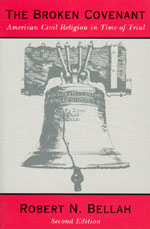 In my essay “Civil Religion in America,” first published in Daedalus in 1967, exactly forty years ago—which, unfortunately, quite a few people think is the only thing I ever wrote—I discussed toward the end the possibility of what I called a “world civil religion.” Naïve though it may sound today, the idea of a world civil religion as expressing “the attainment of some kind of viable and coherent world order” was the imagined resolution of what I then called America’s third time of trial, an idea later developed in my book The Broken Covenant.
In my essay “Civil Religion in America,” first published in Daedalus in 1967, exactly forty years ago—which, unfortunately, quite a few people think is the only thing I ever wrote—I discussed toward the end the possibility of what I called a “world civil religion.” Naïve though it may sound today, the idea of a world civil religion as expressing “the attainment of some kind of viable and coherent world order” was the imagined resolution of what I then called America’s third time of trial, an idea later developed in my book The Broken Covenant.
The first time of trial was concerned with the question of independence and the second with the issue of slavery, but the third, as I then put it, was concerned with America’s place in the world, and indeed what kind of world it would have a place in. That “viable and coherent world order” for which I hoped, would, I believed, require “a major new set of symbolic forms.” So far, I argued, “the flickering flame of the United Nations burns too low to be the focus of a cult, but the emergence of a genuine transnational sovereignty would certainly change this.” A genuinely transnational sovereignty? This utopian idea is something we will have to think about later. But I did hold that, though the idea of a world civil religion would be in one sense the fulfillment of “the eschatological hope of American civil religion,” nonetheless “it obviously would draw on religious traditions beyond the sphere of biblical religion alone.”
This extraordinary vision might make it seem that my essay of forty years ago was hopelessly out of touch with reality—the resolution of the third time of trial being no closer today than it was then, perhaps even farther away—unless one realizes that much of the actual text of that essay was a severe criticism of an America that had gone badly astray and was not helping the world toward a viable and coherent world order at all. I included a long quotation from Senator J. William Fulbright about “the arrogance of power,” and I went on to recall Robinson Jeffers, whose poetry, I said, “seems more apt now than when it was written.” Alas, today those words are once again remarkably apt:
Unhappy country, what wings you have! …
Weep (it is frequent in human affairs), weep for
the terrible magnificence of the means,
The ridiculous incompetence of the reasons, the
bloody and shabby
Pathos of the result.
1967, 2007, where are we? In my own life do I have to go through this twice? I must admit on occasion to saying “Vietnam” when I mean “Iraq.” I envy those of you who have no actual memory of the Vietnam War since you will not have to go through the experience of seeing your country make the same catastrophic mistake twice in less than fifty years.
Still we can hope; perhaps hope is all we have. Times of trial in human history have often been protracted, have lasted a hundred years or more, and if ours seems to have no end in sight, we can still imagine the possibility, even the necessity, of a viable and coherent world order if our catastrophe—ecological, political, economic—is not to become total.
One thing I learned from the complex discussion of the 1967 essay is that for many, particularly religious believers but also secularists, the idea of “a civil religion” is viewed as a threat, one religion competing with and threatening to displace other religions, even being established. All my Durkheimian arguments that any really existing social group necessarily has a religious dimension never quelled the opposition, to the point where, by about 1980, I stopped using the term civil religion and talked about the same issues using other language, language that did not involve me in endless, futile, discussions of definition. So if American civil religion is a bad idea, a global civil religion can only be worse, and I can answer the question of my title, which itself was meant to provoke as much as to describe, in the negative: no, a global civil religion is not possible.
But for the creation of a viable and coherent world order a world civil society is surely an essential precondition, and, dare I say it, any actual civil society will have a religious dimension, will need not only a legal and an ethical framework, but some notion that it conforms to the nature of ultimate reality. The biggest immediate problem is the strengthening of global civil society. As I will elaborate in my next post, I would suggest that perhaps the religious communities of the world may have something to contribute to that global civil society, and, indeed, that their participation may be essential for its success.
[This is the first of three posts drawing on material from a paper presented at From Silver to Gold: The Next Twenty-Five Years of Law and Religion, a conference at Emory University. A version of the full paper will be published in a forthcoming conference volume.—ed.]












